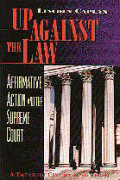Since its inception over thirty years ago, affirmative action has been a difficult and divisive issue. Many Americans see affirmative action as an effective and just mechanism for helping the nation become more unified; others perceive it as a contradiction of the principles that work and ability will be rewarded and that the colorblindness presumed to be underlying the civil rights movement should apply to everyone.
If a single American institution might have guided the country through the thicket of affirmative action, it is the U.S. Supreme Court. Yet, argues Lincoln Caplan, the actions of the Court have only created confusion for the lower courts and intensified discord in the country. Since 1978, when the Court handed down its best-known decision about affirmative action in Regents of the University of California v. Bakke, it has ruled in a dozen cases about the subject, but it has failed to speak with a clear voice. Not one decision has been unanimous, many have been decided by a single vote, and the rulings usually involve a clutch of puzzling, contradictory opinions.
Caplan explores the evolution of affirmative action law by the Supreme Court and demonstrates how this evolution is fundamentally at odds with the way that affirmative action has developed throughout America. Caplan shows that affirmative action programs, properly understood and implemented, remain an indispensable tool for ensuring civil rights and achieving a more integrated, prosperous America. And in fact, many institutions–businesses, universities, local police forces–have actually increased their affirmative action efforts out of their own self-interest
Authors
